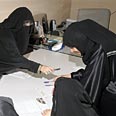
Looking for a loophole (archives)
צילום: AP
'Non-citizens' treated poorly in Arab countries
Problem of foreign migrants' status far more severe in Arab states than in Israel, but much less publicized. Arab families where one parent is a foreigner speak to Ynet about hardships, discrimination
The status of migrant workers and their children is a problematic issue not only in Israel, but in neighboring Arab countries as well.
In at least eight Arab countries, particularly in the Persian Gulf but in Syria too, when a citizen weds a foreign man, their children are not considered citizens and do not have the right to own property. In some of these countries, these children cannot even inherit their mothers' estate, in accordance with a law that forbids foreigners from owning property or real estate.
Suhaila el-Awaji, a businesswoman in Bahrain, married a German man and gave birth to four children. Under local law, she has to apply for stay permits for her children every two years. In addition, her children will not be able to inherit her estate when she passes away.
The "foreign" children also need special permits to travel abroad. Their stay permits expire at the age of 18, but el-Awaji plans to give her eldest son a job in one of her companies once he reaches that age in order to take advantage of a loophole in the law, which grants stay permits to adult workers.
But el-Awaji is considered lucky. Many families facing the same predicament do not have the same options. The Abed el-Aziz family is just one example. Forty-five years ago the head of the family, a Saudi man, married a woman from Bahrain. Yet despite living in Bahrain for many years, he has yet to obtain citizenship. The couple's children are not considered citizens either.
'Ticking bomb'
The problem is even more severe in the United Arab Emirates. "A local woman cannot marry a foreigner. If she does she is punished, forbidden to work or study and is not entitled to medical insurance. She cannot even travel abroad," according to a man who immigrated to the UAE from an Arab country and lives there with a local woman.
"This is a widespread phenomenon that affects some 50,000 women, but the issue rarely makes headlines because protests against it are banned," he tells Ynet. "Many local women married Palestinians from east Jerusalem, the West Bank and Gaza, and if they (men) obtain citizenship they will no longer care about the whole Palestinian, Fatah and Hamas issue.
"The local authorities simply do not want local women to marry foreigners, and they have deported a large number of Palestinians. It is forbidden to discuss the issue. There is a kind of 'censorship'," he says.
The status of foreigners residing in Saudi Arabia is not better. An Iraqi man who immigrated to the country without proper documentation married a local woman, who gave birth to their child in 2005. Shortly after the child's birth, the man traveled to Iraq, but was unable to return to Saudi Arabia because he had been placed on a "black list" of those who entered the kingdom illegally.
Due to her husband's status, the mother could not register her son as a Saudi citizen. Furthermore, Saudi authorities ordered to expel the child from the kingdom within 20 days. The mother pleaded with the authorities and managed to extend the baby's stay permit by 18 months.
"This law is neither Arabic nor Islamic," the 26-year-old mother says. "How is it possible that my brother, who is married to a foreign woman who is not even Muslim, has all of the rights while I have none. And why do they want to deport my baby to a war-torn country as though he were a terrorist or a criminal."
The Al-Arabiya television network recently reported that several hundred people who have been denied citizenship in the UAE have asked to obtain citizenship in New Zealand. Some of them have been granted citizenship status, the report said.
Bader el-Nassim proudly shows off his New Zealand passport. "(While in the UAE) I obtained a fake passport and traveled to a neighboring country. From there I flew to New Zealand through Hong Kong. As soon as I landed I turned to the authorities, and, with the help of an interpreter, told them I was a 'non-citizen' and was carrying a fake passport. I was shocked that they didn’t beat me up.
"After just two weeks I was granted permanent residency status and began working for a Palestinian merchant. Later on I opened my own business and married a young Muslim woman who is a citizen of New Zealand. I became a citizen less than three years later," he recalls.
However, many "non-citizens" want to remain in Arab countries. A month-and-a-half ago a columnist for a newspaper in Bahrain suggested sending a petition with a million signatures to the next Arab summit. The Saudi parliament debates the 'non-citizens' issue every now and then, and articles tackling the problem occasionally appear in the UAE press. Activists have also opened Facebook groups supporting reform, but the status of "non citizens" remains problematic, and is considered by many a 'ticking bomb' within Arab society.
- Follow Ynetnews on Facebook










